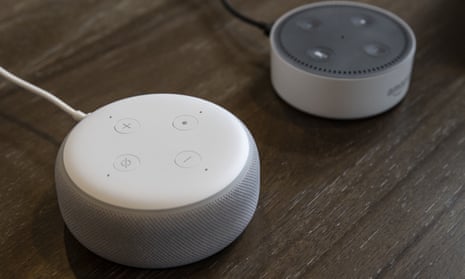Amazon says its AI voice assistant Alexa can now guess what you might be thinking of – or what you’ve forgotten.
At an event in Seattle on Thursday, the technology company unveiled a new feature called Alexa Hunches that aims to replicate human curiosity and insight using artificial intelligence.
“We’ve reached a point with deep neural networks and machine learning that we can actually program intuition,” said Daniel Rausch, the vice-president in charge of Alexa’s smart home features.
Once it is activated later this year, Alexa Hunches will observe its owners’ interactions with connected smart home devices like locks, lights and electricity outlets. When Alexa believes it has detected a regular pattern, such as turning off a television set before bed, the voice assistant will remind owners if they forget to do it, and offer to fix the problem.
“Alexa can have hunches about smart devices that you typically leave on or off, whether that’s leaving a porch light on or locking the back door,” says Rausch.
A common criticism of today’s so-called smart home systems is that they are actually pretty dumb. Many require technical expertise to set up and program, are prone to annoying glitches, and some can enable corporate surveillance. Amazon is trying to make Alexa a user-friendly gateway to simplify and secure the process – and at the same time bring the entire smart home ecosystem under its own umbrella.
David Limp, Amazon’s senior vice-president in charge of its Alexa service, said a new technology called Wi-Fi Simple Set-up would make new smart home devices as easy to configure as simply plugging them in. The company was also touting a cheap new wireless chipset, costing under $10, that other electronics and appliance manufacturers could build into almost any product to add Alexa voice control.
Limp unveiled an Amazon-branded budget microwave oven, costing $60, with Alexa built in, and said that dozens of other companies would soon be making everything from smart fridges, rice cookers and coffee makers to Alexa-powered televisions, speakers and more. “We imagine a future with thousands of these devices in your home,” said Limp. And beyond: Amazon also launched a small Echo Auto device that can sit on your car’s dashboard and add voice-controlled navigation and entertainment.
Limp did not say how many Amazon Echo devices it had sold since introducing them in 2014, but he did say that Alexa now has tens of millions of users worldwide.
The next step for Alexa, said Toni Reid, the Amazon vice-president in charge of the Alexa “experience”, was to make the AI assistant feel more human. “Features like Hunches both lengthen and deepen customer interactions,” she told the Guardian. She said that Alexa is getting better at sustaining longer conversations, and can do things such as responding to whispered commands by whispering itself. Alexa will also soon get a “Guard Mode” to warn owners if it hears something suspicious while they are away from home, such as the sound of breaking glass or a smoke alarm.
With Alexa Hunches, the Amazon team says it will try not to make Alexa’s suggestions too annoying. “Hunches are great at the right time and in the right context but you might not want them when you’re in a hurry,” said Reid. Alexa will typically take a few weeks to learn its owners’ habits using their smart home devices. Using AI technology in the cloud, Alexa builds up a picture of its owners’ routines, paying attention to the time of day, weather patterns and even the changing of the seasons.
Alexa Hunches will be personalised to individuals, says Reid, although it will start by looking at key times of day, such as sunrise and sunset, when people often interact with their smart home devices. Although the Hunches technology will only work with connected home gadgets for now, Reid said that Amazon would build on the technology as time goes on. That could mean Alexa suggesting your favourite music or radio shows without being asked, and ultimately (and profitably) recommending regularly purchased items for your shopping list.
Limp made no mention of privacy during the Alexa launch, although Amazon says it encrypts users’ sensitive data. The company made headlines in May when Alexa accidentally sent a couple’s conversation to one of their contacts.
“I’m wary of the drive to adopt more opaque systems that have the potential to impact people’s real-world lives in ways that can be problematic,” said Daniel Kahn Gillmor of the ACLU’s Speech, Privacy, and Technology Project. “A well-trained model for the kinds of use cases proposed is basically a summary of a person’s typical habits. I’d like to know what steps is Amazon taking to protect their users’ habits from leaking or exposing their behavior to others. And what if a Hunch goes wrong, for example failing to remind you to lock the door and you get robbed? What sort of liability should Amazon hold?”
Alexa Hunches will be turned on by default, although anyone creeped out by a disembodied voice recommending that they lock all their doors will be able to turn the feature off with a simple voice command.
